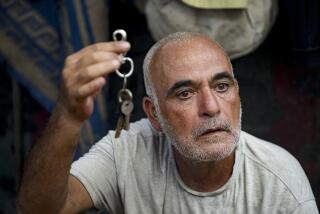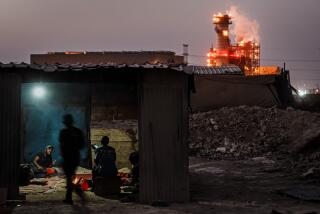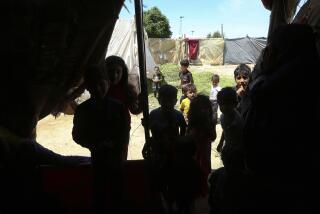Fearful Kuwaitis Waiting in Bahrain : Exiles: Many foresee difficult times ‘even when country is free.’
- Share via
MANAMA, Bahrain — For many Kuwaitis forced to wait impatiently in exile, thoughts of war held little joy Wednesday despite the possibility that it might liberate their homeland.
“Remember, we all have mothers and brothers and children we left behind,” said Mohammed Adjami, who was a civilian engineer with the Kuwaiti air force before Iraq’s invasion of his homeland Aug. 2. “We don’t know what will happen to our relatives in a war.”
An estimated 300,000 Kuwaitis are still left in the country, reduced from a prewar population of 700,000, according to Abdullah Sharhan, a former minister of communications who acts as Kuwaiti spokesman here.
Tens of thousands of Kuwaitis were out of the country at the time of the invasion on their annual vacations. They have since drifted back from Europe to exile homes in Saudi Arabia and Bahrain.
On Wednesday morning, before U.S. warplanes struck Baghdad, the Kuwaiti Embassy in Bahrain was eerily deserted. Apart from beefy security guards and posters proclaiming “Free Kuwait,” there was little excitement or sense of anticipation. Exiles drifted in listlessly during the day to exchange rumors over cups of thickly sweetened tea.
“There will be difficult times even when our country is free,” said Dr. Sanad Fadala, an ear, nose and throat specialist who has volunteered to work in a Bahrain hospital until the crisis is over. “There will be conflict between the people who stayed behind and the people who fled, between the 400,000 Palestinians and Kuwaitis and the psychological effect of war on all the people.”
Fadala said he had just received a letter from a brother who remained in Kuwait. The letter, which was smuggled out through Jordan, said that in the past few days, women and children had begun living permanently in basements because of the threat of air attack.
A large group of exiled Kuwaiti doctors has formed in Bahrain under the auspices of the Red Crescent Society, the Muslim equivalent of the Red Cross, to prepare to return to the country with emergency medical care once the war is over.
“We’re ready to dispatch our volunteers the moment we hear from the U.S. Army,” said Dr. Ibrahim Bahbahani, the head of the Kuwait Red Crescent Society.
In addition to about 20 doctors here, the group has trained about 400 paramedics in first aid and civil defense to rush in once the fighting stops. A planeload of medical supplies and tents has been provided by the International Committee of the Red Cross, and an appeal for assistance has been raised throughout Europe.
“It’s a scary time, because you don’t know when you will be killed,” Bahbahani said. “But it’s our country.”
One doctor said that soon after the arrival of Iraq’s elite Republican Guard in Kuwait, his hospital began receiving the bodies of young Kuwaiti men who had been executed after torture. They were usually shot between the eyes, although some were hanged from lampposts.
The doctor himself was detained for 26 days with six other doctors before being allowed to leave the country. He said hospitals in Kuwait are now manned by Iraqi doctors and medical staff since the execution of six Kuwaiti doctors for providing medical care to Kuwaiti resistance forces.
Badr (who declined to give his second name), a Kuwaiti university lecturer in education, said Kuwaitis who stayed behind were longing for revenge against the Iraqis.
“My concern is not the civilian population, because they are well dispersed and the Iraqi soldiers in the city are only conscripts,” Badr said. “My concern is the oil installations.”
More to Read
Sign up for Essential California
The most important California stories and recommendations in your inbox every morning.
You may occasionally receive promotional content from the Los Angeles Times.













